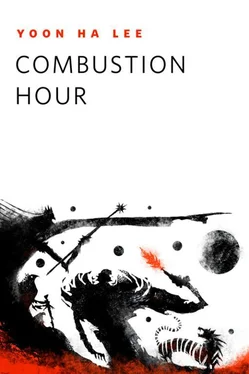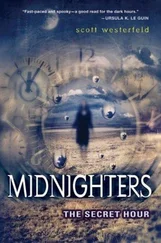Yoon Ha Lee
COMBUSTION HOUR
This story is about the eschatology of shadow puppets.
* * *
You’ve been a long time away from home with its vast, pale stage of textured silk and the queen’s everywhere garden. There is only a binary of colors in your existence, just as you are supposed to narrow everything into the binary of target and not-target . Nevertheless, your language has words for colors. They are not red or ochre or azure . They are not even white or black , the logical defaults. But there is a word for the color of a string just as it is slit. Another for the color of the queen’s favorite flowers, which coil so promisingly from each doorway. One for the color of fire. That last is rarely spoken, especially in the queen’s presence.
Your uniform is the same color as the queen’s gloves; it is defined that way. The queen’s hands, they say of her knights. And now you’ve come back to the court with its thorn-collared tigers, its hawk-headed courtiers, its endlessly thwarted geodesics. The summons didn’t give a reason why your return was so urgent, but you can guess.
The world-tapestry’s weave is replete with imperfections: stains scrubbed out, clots of thread, small tears subtly mended. Like the queen’s court entire, you glide frictionlessly across the tapestry’s surface. But you are always aware that there is a world beyond the tapestry, in three dimensions of space rather than two, and, perhaps, the pitiless audience; you are always aware of the faraway lanterns.
The queen’s court measures time by her smiles. Lately she has smiled less and less frequently. For the distinction between light and dark has been diminishing little by little, a phenomenon your soldiers observed even in the Knotted Reaches. And that means that the lanterns, little by little, are going out.
People quiet as you pass by them, lengthening and shortening in accordance to the laws of geometry, your position relative to the light sources. They have a name for you: the Knight of Pyres. It is not, despite the rumors, a reference to the nations you’ve torched, or even to the smoke like Cantor dust that drifts endlessly from your gun. You have never seen any point in telling them where the name comes from. After all, the queen would disapprove. Even in an airless world, a shadow-queen’s disapproval can suffocate.
You approach the throne. The queen is flanked by her guards, and her poets, and her bearers-of-flowers. The last scatter petals of grave’s-breath at your approach. They have a fragrance like sickle nights and slivered moons. You lay your gun before the queen, kneel, and wait.
It’s not a long wait, just enough to make the point that she commands your loyalty still. You have never liked the queen, but you concede her efficiency. Besides, you don’t have to like her to do her will. She made that clear to you a long time ago.
“I did not wish to recall you from a campaign where you were enjoying such success,” the queen says. Her voice is low, and sharp the way that ice is sharp. At least there is no rebuke in it. “I have another mission for you.”
Your lieutenant is competent enough. You have no doubt that she can finish the current war of subjugation to the queen’s satisfaction. There’s little left to do in any case. You could recite the figures readily enough. The houses slashed to tessellated debris, the number of knives, the dimensionless weight of ashes. But the queen has not asked about any of this, so you hold your silence.
“The lanterns are becoming exhausted,” the queen says. The courtiers stir like a tremor in the tapestry: she has spoken the unspeakable after all. “You know what happens when all the lights go out.” One of the tame tigers yawns; a poet mutters half a verse-of-warding in hexameter flattened to a scrap of desperation. The queen’s head turns slightly. The poet shivers and subsides.
The lights have gone out before, but they have always come back on. On those occasions she made use of you and your gun, too. You remember the last such nightplunge. In the darkness your face had no boundaries. You were unable to discern the scars in your history or the contours of your future. When the lights came back on, you had to rebuild yourself from ligatures of shadow and shapes whose names you had to mine out of convolute dreams. You started with your gun. The queen, it is said, started with her scepter. You remind yourself of this every so often, because it’s important to understand your adversaries, especially when you have something in common.
“You have only to command me,” you say, which is not quite the case. She’s not incapable of giving an unwise order.
The lanterns are an outside phenomenon, but it’s not entirely true that your people have no influence over the world beyond. You are the proof of that.
The queen’s smile in her oval face is a gash of light. “Then my command is this,” she says. “Travel to the eastern border and bring back the Jewel of Mirrors. You will have to fight the eastern philosopher-king for it. But if the lanterns are failing us, if the world beyond is starved of mornings, then we will have to feed the lanterns ourselves. A foreign jewel is a small enough sacrifice.”
It’s not the solution you had expected. In times past you have gone hunting in the world beyond. But the supply of prey is finite, and you are not surprised that she knows what to do after it is exhausted.
East, right, away from the gates-ever-gaping; it’s a matter of cartographic convention, but the dawn-voyaging symbolism counts for something. What the queen isn’t saying is that the philosopher-king will have his armies, and his citizens, and his libraries of tomes inscribed in shadow-script as tiny and perfect as insects. What she isn’t saying is that she wants you to reduce his land to a rubble of pixels.
“Your will is mine,” you say, the old bitter formula. At least nothing more is expected of you.
The flower-bearers scatter petals of birds-ascending, so called because the flowers in full bloom resemble firebirds caught in the incandescent act of transporting themselves off the tapestry and into the impossible z-axis sky. You hide your cynicism; long practice.
The queen nods, and you take up your gun. “You will leave tomorrow,” she says, and you wish she had given you permission to quit her presence straightaway. But instead you bow, and linger in the court for appearance’s sake, never comfortable amid the shadow-edges of spear and vine and people who know better than to come too close to the queen’s unchancy favorite.
* * *
At this point, it may be fruitful to review facts of stellar evolution. Stars like our sun effloresce into red giants, then shrink into white dwarfs, and eventually cool; in an older universe, the resulting black dwarfs would lurk in the vast reaches like carrion husks. More massive stars singe the darkness with heavy elements as they crumple into neutron stars. More massive still, and stars swallow themselves, leaving only black holes.
What’s notable is not just the coruscating variety of colors, but the fact that each of these trajectories, while dependent on mass, eventually ends in darkness.
* * *
You know a lot of stories about the Jewel of Mirrors. None of them help you.
The Jewel of Mirrors is a necklace guarded by a bird that has been bricked up in a tower since the hour of its birth, and whose song can reduce shadow to the transparency of dew. To slay the bird, you must reflect its voice upon itself so that it boils away into formlessness. It is not known whether the bird would welcome this release.
Читать дальше













